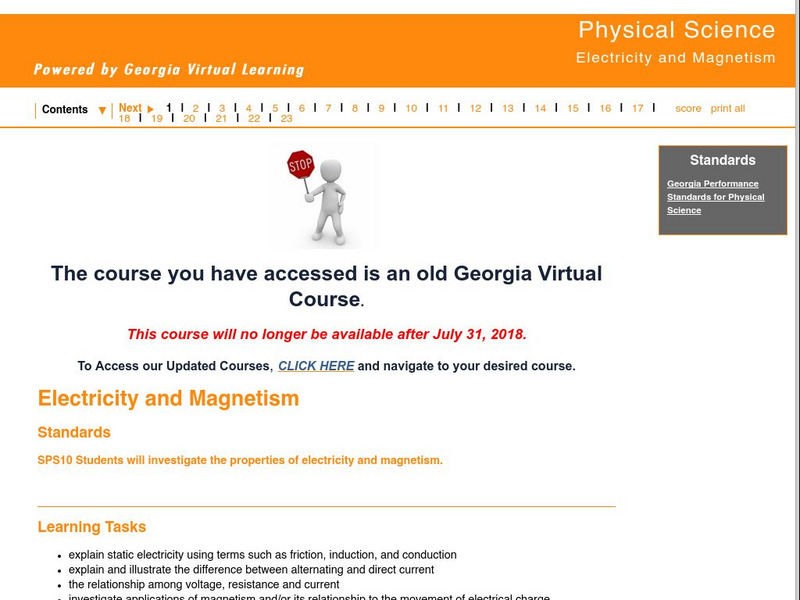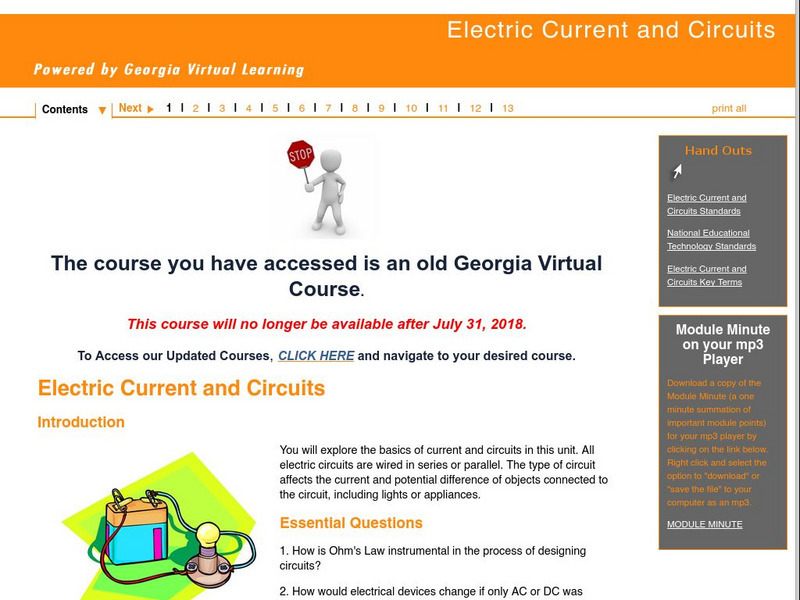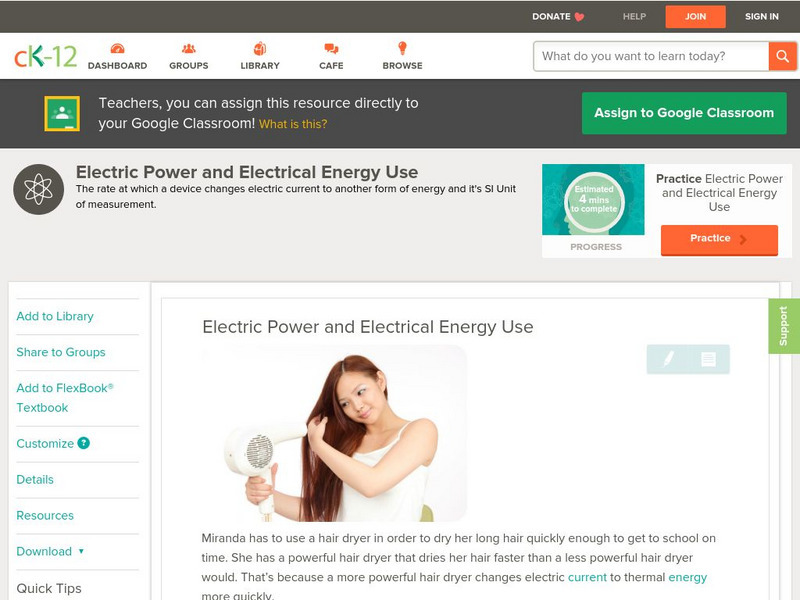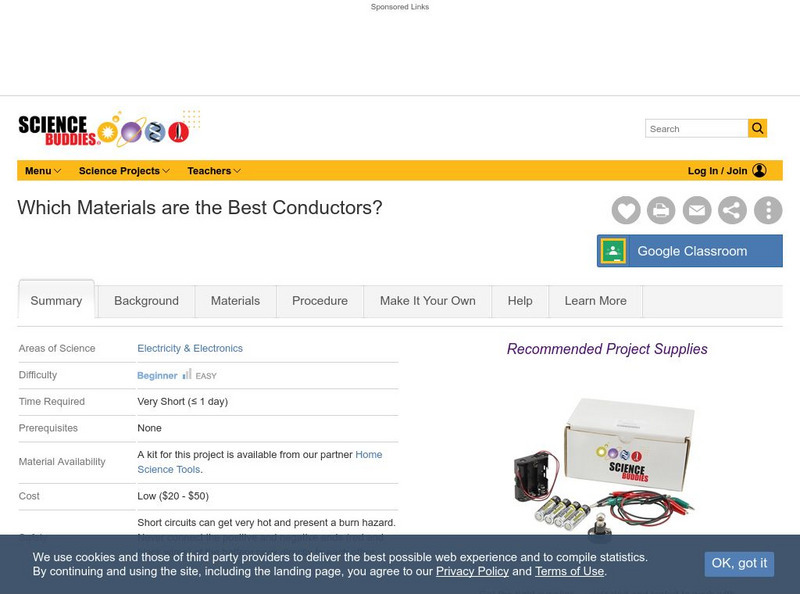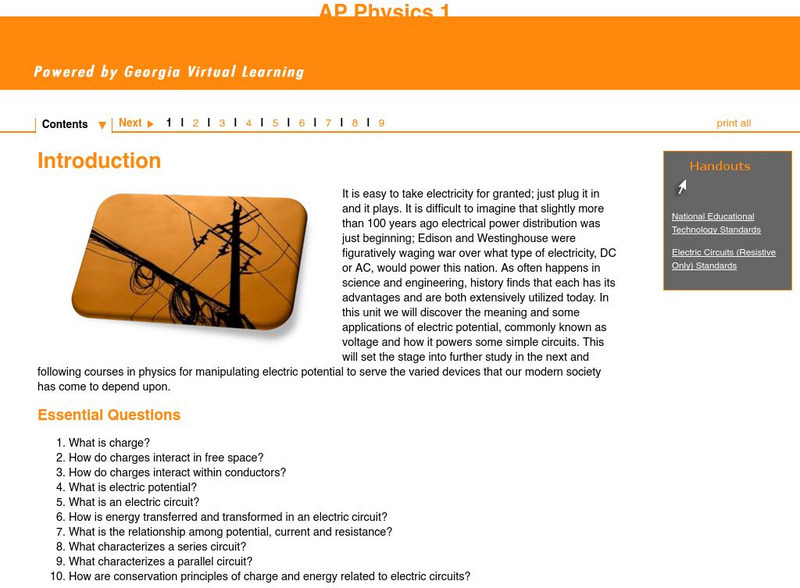Hi, what do you want to do?
Curated OER
Unit Circle and Triangle
Young scholars apply the Unit Circle to solve ratios of triangles. In this geometry lesson, students derive the different ratios of a triangle using the Pythagorean Theorem. They find the angles of a unit circle using a right triangle.
Curated OER
Humanitarian Aid in Iraq
High schoolers research the impact of the Iraqi war on the civilian population in Iraq. They read an article, participate in class discussion and consider efforts that are being made to alleviate difficult conditions.
CK-12 Foundation
Ck 12: Physical Science: Electric Current
[Free Registration/Login may be required to access all resource tools.] Explains what electric current and voltage are and why electric current occurs.
CK-12 Foundation
Ck 12: Fourth Grade Science: Physical Science: Electric Current
[Free Registration/Login may be required to access all resource tools.] Defines electric current and relates electric current to different materials (insulators and conductors).
Concord Consortium
Concord Consortium: Stem Resources: Electric Current
In this interactive, students can explore how current, voltage, and resistance are related in a model showing the flow of electrons in an electric circuit. They will learn about Ohm's law and how other forms of energy can be made from...
Exploratorium
Exploratorium: Science Snacks: Physics/electricity & Magnetism
Exploratorium Science Snacks are miniature science exhibits and experiments that can be made with common, inexpensive, easily available materials. These electricity snacks represent a set of devices that you can build and experiment with...
Georgia Department of Education
Ga Virtual Learning: Currents, Resistors, and Power
In this interactive tutorial students will learn about electric current, resistance and current density. Learn how current density relates to electric field strength and how resistance produces heat.
Georgia Department of Education
Ga Virtual Learning: Physical Science: Electricity and Magnetism
Students learn about static electricity using terms such as friction, induction, and conduction. They also explain and illustrate the difference between alternating and direct current, and understand the relationship among voltage,...
Georgia Department of Education
Ga Virtual Learning: Electric Current and Circuits
Students have the opportunity to explore the basics of current and circuits in this online module. Some of the activities include interactive animations, informational text, practice problems, and lab experiments.
Canada Science and Technology Museum
Canada Science and Technology Museum: Background Information for Electricity
The Canada Science and Technology Museum answers some of the most common questions about electricity. For example, get the definition of electricity, the difference between alternating and direct currents, and learn how a fuse works.
CK-12 Foundation
Ck 12: Fourth Grade Science: Physical Science: Electric Circuits
[Free Registration/Login may be required to access all resource tools.] Describes the parts of an electric circuit and identifies electric safety features and how to use electricity safely.
CK-12 Foundation
Ck 12: Physical Science: Electric Power and Electrical Energy Use
[Free Registration/Login may be required to access all resource tools.] Electric power and electric energy use of appliances and how to calculate them.
Science Buddies
Science Buddies: Which Materials Are the Best Conductors?
There are two main types of materials when it comes to electricity, conductors, and insulators. What are they made of? Find out by testing different materials in a circuit to see which ones conduct the most electricity.
Science Buddies
Science Buddies: Project Ideas: Which Materials Are the Best Conductors?
A simple science fair project to test whether electricity can flow between two things. The Science Buddies project ideas are set up consistently beginning with an abstract, objective, and introduction, followed by a section on terms,...
Georgia Department of Education
Ga Virtual Learning: Ap Physics 1: Electric Circuits
In this unit students discover the meaning and some applications of electric potential, commonly known as voltage, and how it powers some simple circuits.
Thinkport Education
Thinkport: Analyzing Data Sources and Author's Purpose: Electric Currents
In this science-themed literacy lesson, students learn how to determine the author's purpose and follow the development of that purpose.
Science Museum, London
Science Museum: Pocket Motor
Teacher directed activity shows students how flowing electrical current produces a magnetic field by building a simple motor.
CK-12 Foundation
Ck 12: Physical Science: Electric Conductors and Insulators
[Free Registration/Login may be required to access all resource tools.] Explores electrical conductors and insulators and the path of least resistance.
Other
The Blobz Guide to Electric Circuits
An exciting interactive site of games, activities, information, and quizzes about electric circuits. You'll learn what makes circuits work, all about conductors and insulators, switches, changing circuits, and circuit diagrams. Learning...
BBC
Bbc Schools: Ks2 Bitesize: Science: Physical Processes: Electrical Conductors
Find out which material will save Steve from getting shocked by the electric eels. Following the activity, read more about electrical conductors, and then take a quick quiz to check for understanding.
CK-12 Foundation
Ck 12: Physical Science: Electric Safety
[Free Registration/Login may be required to access all resource tools.] Overview of electric safety: short circuits, electric safety features, and how to use electricity safely.
Ducksters
Ducksters: Physics for Kids: Electric Current
Kids learn about electric current in the science of physics including the flow of electrons, measurement, alternating, and direct current.
Khan Academy
Khan Academy: Electrical Engineering: Introduction
Some basic concepts to introduce the electrical engineering course. Become familiar with engineering numbers and notation, and learn about the two most important electrical quantities: current and voltage.
ArtsNow
Arts Now Learning: Using Dance to Explore Electricity [Pdf]
After analyzing examples of conductors and insulators, 5th graders will work in small groups to craft a dance that depicts an electrical current and how it is affected by a conductor or insulator. Students will present their dances to...











